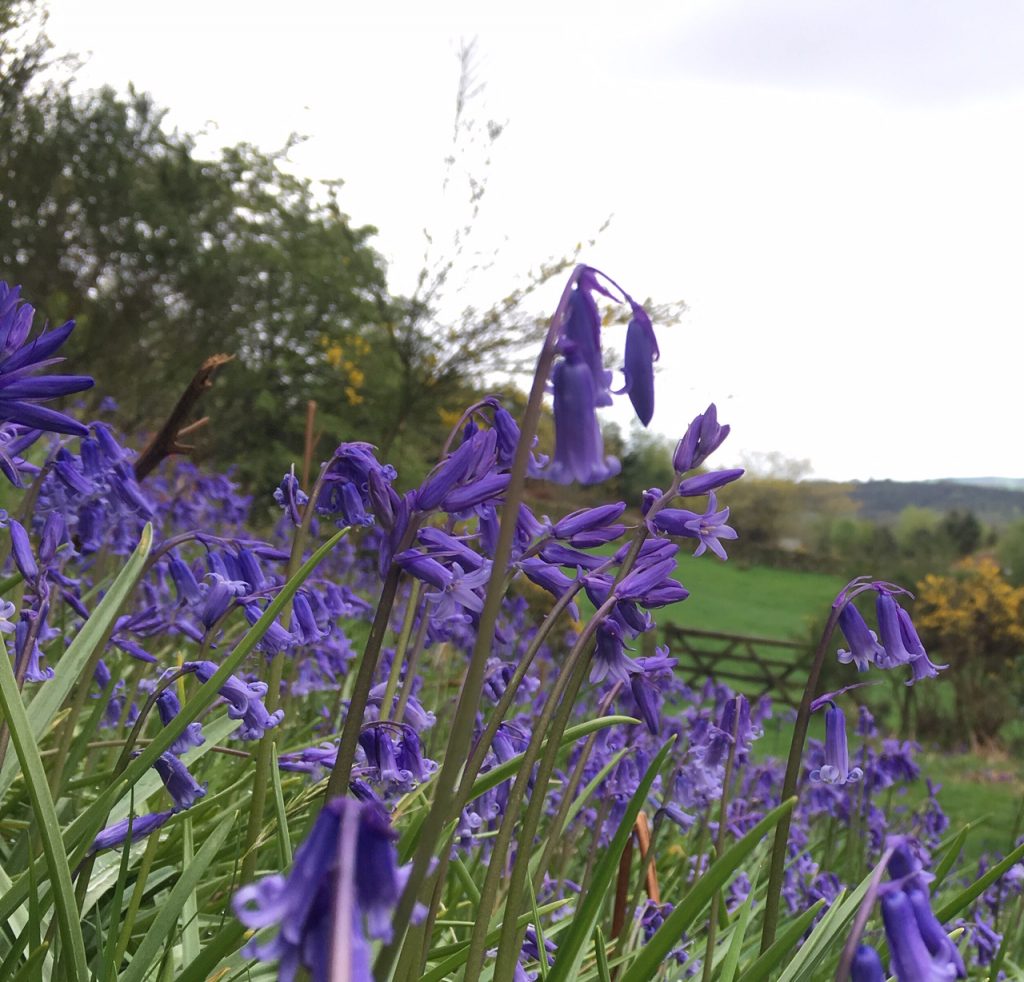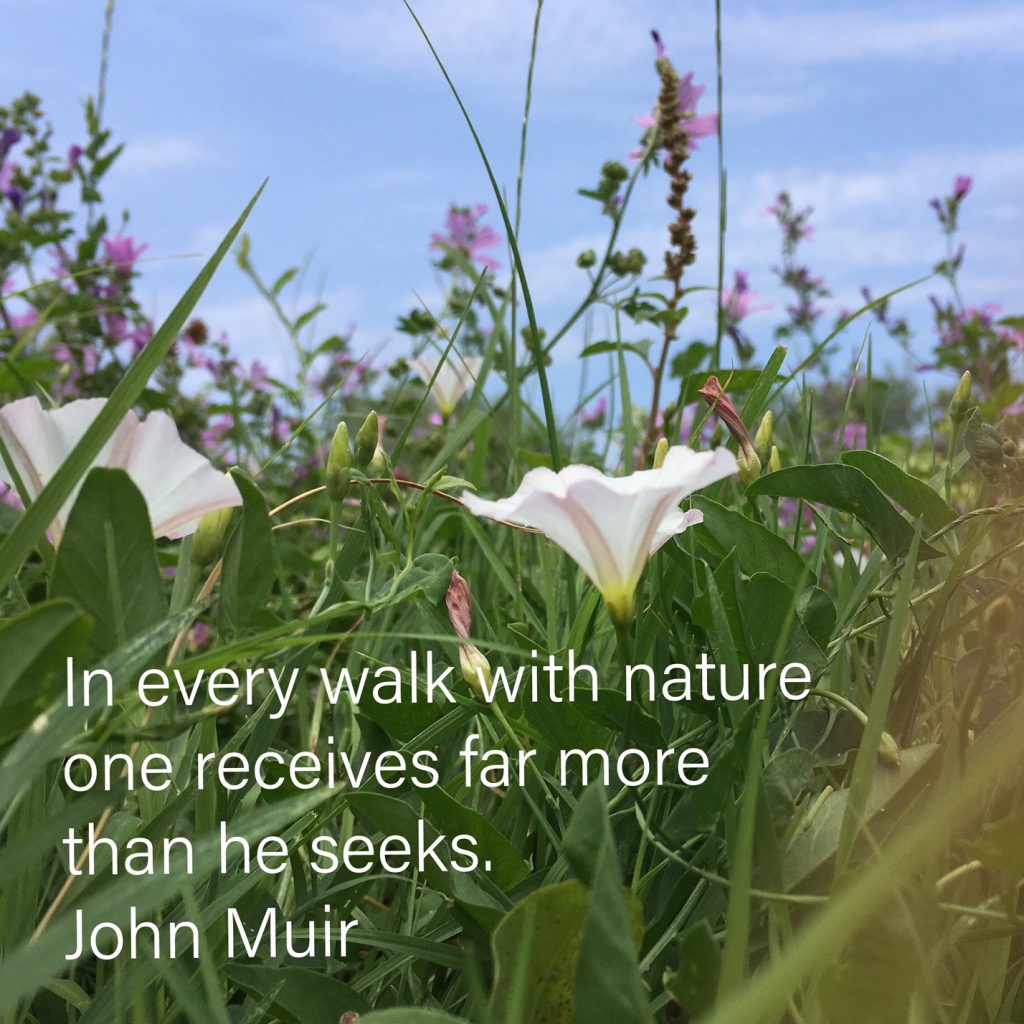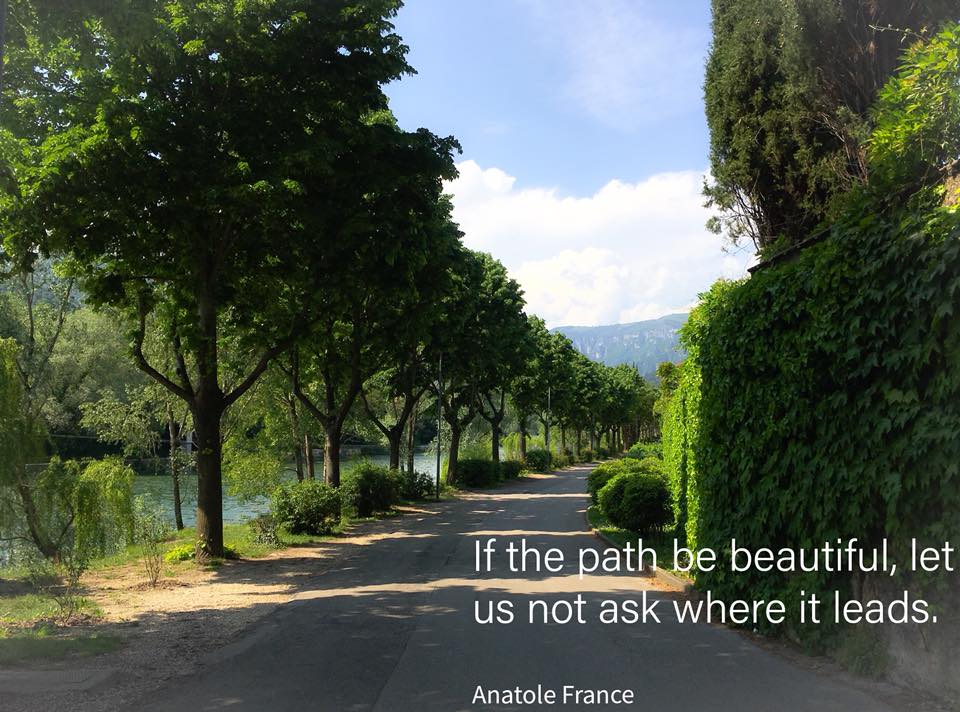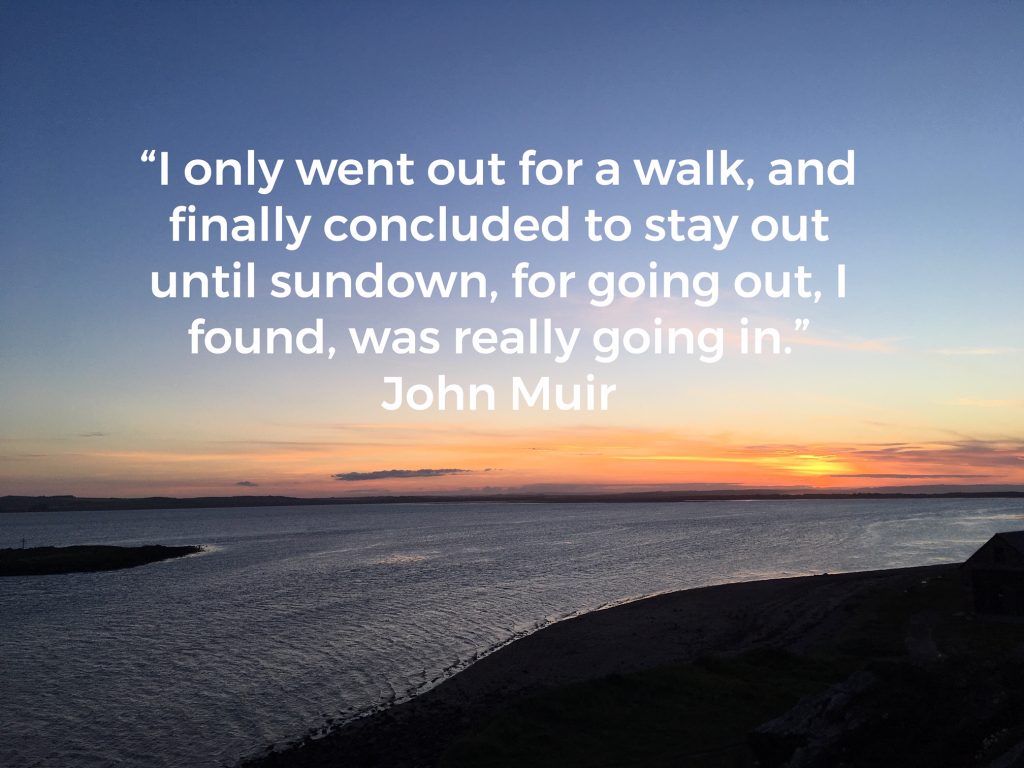Walk yourself happier: 7 ways in which walking can help your mental health
Pause for a minute. Imagine that you’re in a wood. It’s quite light and open, with space between the trees……those beautiful, spreading oak trees, with great branches like arms that reach out as if to enfold you in a safe embrace.

The sun filters through the leaves, dappling the ground below, and playing on your face. As you move you pass through shafts of light. You can feel its warmth. Pay attention to the sounds you can hear – the rustle of the wind moving the branches of the trees, the twittering of song from birds, invisible, in the canopy above you. As you walk along, you hear the scrunch of twigs and fallen leaves under your feet.
What’s that smell? Fresh and musty at the same time – damp earth and vegetation; perhaps it rained earlier or there was a heavy dew. And then behind that, a sweet perfume that comes and goes – you see a carpet of blue under the trees. Thousands of bluebells, their delicate smell massed together to reach your nose. Just take a moment to see, hear, feel all of that wonderful space of nature, to let it sink in to you. Let it feed your soul. Take a moment – before you come back.
Why walk?
When I was thinking about writing this blog, I imagined how I would describe why I like to walk outside. Everything I thought of seemed rather worthy……walking as something I ‘should’ be doing, part of that ‘must get your 5-a-day’ mentality. But when I thought of a recent walk – outlined above – I recalled all the myriad, tiny, experiences that happened in the moment, which combined to lift my spirits and nourish my soul.

That particular walk was an immersion in nature. Spaces like that are available to most of us, though to really get away from it all can be a challenge, especially if you live in a city or don’t have a car. But that doesn’t mean we can’t experience nature while walking – even in the town. In this blog I look at some of the ways in which walking, and walking in nature, can benefit your mental health.
7 ways in which walking can help your mental health
1. Walking helps your whole body
The most fundamental reason for walking helping your mental health, is that it helps your physical health. Our mind and body are intertwined – literally, given that the mind rests within the body.
I mentioned in my last blog (10 Stress Management tips) about the benefits of walking if you suffer from stress symptoms. Walking can help release some of the fight/flight hormones that build up when you’re feeling stressed. The simple act of moving in this way helps release the tension in muscles that may have become hunched and stiff. As you start to become more physically active, you will feel fitter and stronger, which can have the knock-on effect of improving how you feel about yourself. Remember, though – you are not competing against anyone. This is about you feeling better for your own sake.
2. Walking can reduce symptoms of depression

Physical activity stimulates the release of endorphins, which can boost your mood in two ways. Firstly, endorphins stimulate a positive feeling similar to the effects of morphine; with vigorous exercise this can produce a ‘runner’s high’, feelings of euphoria – but even with mild to moderate exercise the effect can still be noticed and can produce an energised feeling, so that, counter-intuitively, getting exercise can give you the feeling that you have more energy to tackle other tasks. The second way in which endorphins can help, is that they diminish the perception of pain – so if you are experiencing pain (assuming it’s not linked to the activity of walking) then the release of endorphins has an analgesic effect which can help reduce the discomfort you experience.
3. Walking can help you manage your thinking
Walking seems to help my brain work differently. That’s my experience – that somehow the act of movement stimulates my mind to work in a different way, and so if I’ve been ruminating about something where my thoughts just go round and round the same circuit, getting out there moving somehow shifts them off the train tracks (I’m not saying they never jump back on again, but a little derailing does help).
This may be because doing something physical requires a certain amount of attention by the brain – even if it seems pretty much instinctive – and therefore there’s a shift in focus which reshuffles everything else that’s going on in there. Indeed, as well as stimulating endorphins, as mentioned above, walking can alleviate the impact of cortisol – the stress hormone – by allowing its release through the body, which can reduce anxiety symptoms such as racing or intrusive thoughts.
4. Walking puts you in a different space
Well, duh, of course it does! It makes sense that the environment that you’re in is going to have an effect on your mood. Just think for a moment about how you’d feel if you’re sitting in a room with no windows and the walls painted grey, compared to sitting in a sunny space with a view over a sparkling sea. Where you are can also have less obvious effects connected to your (sometimes unconscious) associations – perhaps being in your house recalls a big argument that you just had with someone close to you, or all the maintenance tasks that you need to get done, for example.

Ideally I’d transport myself into the bluebell wood I mentioned earlier, in the blink of an eye. But it doesn’t need to be that extreme a contrast. Shifting yourself out of the space that you’re in can help shift your mindset. You can try this by simply going outside and consciously imagining those worries or preoccupations lifting off your shoulders and floating off into the greater space that surrounds you. I’m not pretending that they’re going to be gone forever, but allowing their release for even a short period of time can help boost your mood and improve your resilience to deal with them when they return.
5. Walking can help you connect with others
Walking with someone can give you the opportunity to talk about things that are bothering you in a neutral environment. For some people, ‘being alongside’ as they talk can be easier than talking about a difficult subject face to face. It can be a really helpful way of offloading – as with the last point, you can ‘let all this stuff out’ into the wider space rather than in the confines of a room. Or the flipside – when you’re walking with someone it’s OK not to talk, too, and just being in company with someone can improve your psychological health by meeting your need for human contact. Humans are social animals and we need to connect.
Walking can be a way of making new contacts and friends – for example through walking groups. There are many of these around the country geared to all ages and abilities, for example, where I live there is a fantastic local organisation that runs wellbeing walks. There’s some links at the bottom of this article.
At a basic level, walking helps you connect with others, in the opportunity it gives to say hello, smile, nod to the people that you pass as you’re out. Even these little contacts have a positive effect on your wellbeing and to a fundamental need for recognition by others.
6. Walking can help you connect with yourself

In contrast to the social benefits, walking can also help you to soothe yourself. Getting out for a walk allows the opportunity to take some time for yourself and pay attention to how you are away from the hurly-burly of whatever else is going on in your day. This isn’t just about escaping from stressful situations by absenting yourself from them – although that may also be relevant – but more about taking a few moments to notice how you are, in the moment, as you walk.
Walking can give you a chance to be mindful, for example by bringing your attention to the movement of your arms, legs, feet, and noticing any stiff or sore points. By walking mindfully you can connect to the environment around you, as well as your body, and give yourself a rest, even briefly, from what’s going on in your head. There’s a link to a mindful walking exercise below.
7. Walking can be a way for you to commit to caring for yourself
There is lots of information around on how exercise is good for you mentally and physically……‘not getting enough exercise’ can become another stick for us to beat ourselves up with. But equally, the way we exercise often changes through our lives as our bodies change, and sometimes it is only when we experience an injury that we realise that our bodies aren’t machines that we can just keep on pushing.
Walking is a non-aggressive way of getting exercise. It gets the heart going, the blood pumping, the limbs moving, and with less impact on your joints and muscles than running or working out in the gym. It can help you sleep better, especially with the added effect of getting out in the fresh air. As we age, and if we have other added issues (physical or emotional), our bodies take longer to recover from illness or injury. You’re less likely to experience an injury when out walking than with most other forms of exercise. Yes, you might want to run a marathon – but perhaps your body isn’t ready for that yet. Rather than noticing what you can’t do, in walking perhaps you could look after your body; by valuing your body you are sending a subliminal message to yourself that you are important.

The equality of walking
Walking is cheap. It doesn’t require a gym membership. You don’t need to be an athlete. A little is better than none. If you’re a wheelchair-user you can still get the benefits of being outside, though you may not have as much opportunity for physical exertion. Even in a city you can connect with the natural world…….through gardens, and trees, and birds.
It’s important to recognise that you may not be well enough, physically or mentally, to walk at the moment, in which case reading this blog may well be frustrating! If this is the case the last thing I want to do is add to your burden. Walking isn’t possible for everyone, and if you’re not sure, I suggest you check with your GP. There are other ways that you can look after yourself and prioritise your needs, to your own level of physical, mental and emotional ability right now, and listening to your body may the best way to get some clue as to what those ways might be.
How can I motivate myself to walk?
With the above in mind, if you’re not walking at the moment and would like to but are struggling to find time or motivation to do it, here are some suggestions:
- Be realistic and start small. Don’t push yourself to get out for an hour’s walk every day. If time pressures are a factor, start by fitting small walks into your day – 5 minutes after lunch, or getting off the bus a stop early.
- Do it with someone else. Buddy up with a friend or join a group if you think making a plan with someone else will help motivate you. I’m hoping to launch a walk-and-talk therapy service soon, to offer the option of counselling while walking.
- Focus on you. Don’t compare yourself with what others are doing. You don’t need to compete with anyone – even yourself. Take each day as it comes. One day where you get out for a walk is one day more than none!
- Most importantly – be kind to yourself. Sometimes you won’t feel like going outside your door, and if that happens allow yourself to recognise that that is just one day, and that tomorrow may well be different.

If I reflect for a moment on what walking means to me, so many things come up. When I walk I have space to get a little distance from whatever is going on, right now, in my life. Sometimes small things that I experience while I’m out walking can make a real difference to my day – hearing the first swifts of the summer screaming overhead, for example, can bring me a fleeting moment of joy that I reflect on throughout the day.
I feel connected to the rest of the world by the response of my senses to what’s around me, whether that be the sound of the sea or the taste of wild garlic I pick for my dinner. I feel connected to people, partly through encountering them when I’m walking, but also because some walks trigger memories of other people in my life, including those no longer alive, and for that I am grateful. All these myriad, sometimes tiny, sometimes fleeting experiences as I walk combine to……to what? Well, usually, to make me feel, in some way, better.

Information & resources:
Find a walking group via the Ramblers .
Wellbeing walks in East Lothian .
